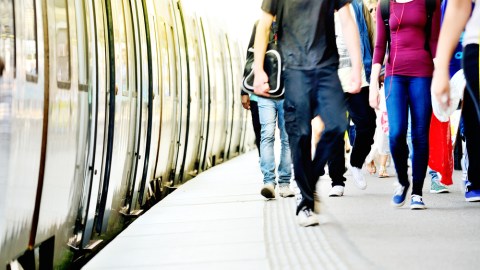How Does Commuting Affect Your Happiness? It’s the How and the How Long.

How you get to work, and how long that journey takes, generally determine the level of satisfaction you have with your commute, according to British and Canadian researchers. The happiest commuters, following a survey of students and staff at McGill University, are those who walk, take an inner city train, or bike (in that order). Those who drove, took the metro, or rode the bus were the unhappiest with their commute. Commuters who took the bus only in inclement weather were the least happy with their transport experience.
“Travel time obviously matters: on the whole, people with longer commutes were less satisfied with them. But to walkers, bikers, and bus riders, an extra ten minutes of commuting only reduced satisfaction by about half as much as it did for drivers, or metro or train riders.”
Your daily means of transport also affects your health, with drivers tending to be more overweight than those who travel by other means. Surprisingly, taking the bus or train might as be as beneficial to your health as walking or riding your bike.
“Users of public transit had 1.46 percent (for females) or 1.48 percent (for males) less body fat than drivers. These numbers were 1.37 and 1.35, respectively, for bikers and walkers. In other words, public transit users actually had lower amounts of body fat than so-called “active” commuters.”
While some cities’ zoning policies actively discourage living close to your workplace, Geoff Wardle predicts in his Big Think interview that cities will have vastly superior connectivity technology by 2050. By that time, larger swaths of the city will have become community-based, predicts Wardle.
Read more at Vox
Photo credit: Shutterstock





